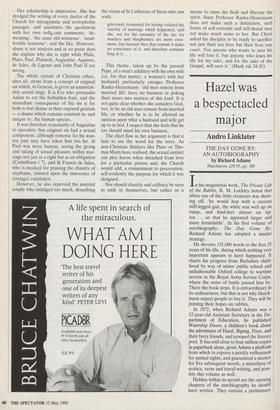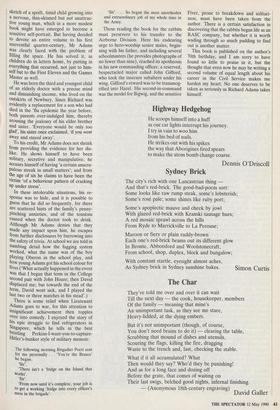Hazel was a bespectacled major
Andro Linklater
THE DAY GONE BY: AN AUTOBIOGRAPHY by Richard Adams Hutchinson, £18.95, pp. 388 In his magisterial work, The Private Life of the Rabbit, R. M. Lockley noted that when one of the little creatures was show- ing off, 'he would hop with a curious stiff-legged gait, the white scut well up on rump, and hind-feet almost on tip- toe . . . so that he appeared larger and more formidable'. In his first volume of autobiography, The Day Gone By, Richard Adams has adopted a similar strategy.
He devotes 135,000 words to the first 25 years of his life, during which nothing very important appears to have happened. It charts his progress from Berkshire child- hood by way of minor public school and unfashionable Oxford college to wartime service in the Royal Army Service Corps, where the noise of battle passed him by. There the book stops. It is extraordinary in its ordinariness, but that is not why Hutch- inson expect people to buy it. They will be pinning their hopes on rabbits.
In 1972, when Richard Adams was a 52-year-old Assistant Secretary in the De- partment of Education, he published Watership Down, a children's book about the adventures of Hazel, Bigwig, Fiver, and their furry friends, and scooped the literary pool. It has sold close to four million copies in paperback alone, given Adams a platform from which to express a prickly enthusiasm for animal rights, and guaranteed a market for five subsequent novels, a miscellany of erotica, verse and travel-writing, and poss- ibly this volume as well.
Hidden within its sprawl are the opening chapters of the autobiography he should have written. They contain a preliminary sketch of a spoilt, timid child growing into a nervous, thin-skinned but not unattrac- tive young man, which in a more modest book might have emerged to become a sensitive self-portrait. But having decided to devote an entire volume to his first uneventful quarter-century, Mr Adams was clearly faced with the problem of filling the space. He has solved it, as children do in letters home, by putting in everything that occurred, not just to him- self but to the First Eleven and the Games Master as well.
He was born the third and youngest child of an elderly doctor with a precise mind and diminishing income, who lived on the outskirts of Newbury. Since Richard was evidently a replacement for a son who had died in the 'flu epidemic the year before, both parents over-indulged him, thereby arousing the jealousy of his elder brother and sister. 'Everyone would be only too glad', his sister once exclaimed, 'if you went away and stayed away'.
To his credit, Mr Adams does not shrink from providing the evidence for her dis- like. He shows himself to have been solitary, secretive and manipulative; he accuses himself of having 'a certain unscru- pulous streak in small matters'; and from the age of six he claims to have been the victim 'of a behaviour pattern of cracking up under stress'.
In these intolerable situations, his re- sponse was to hide, and it is possible to guess that he did so frequently, for there are scattered hints of the family's penny- pinching anxieties, and of the tensions caused when the doctor took to drink. Although Mr Adams denies that they made any impact upon him, he escapes from further disclosures by burrowing into the safety of trivia. At school we are told in numbing detail how the fagging system worked, what the name was of the boy playing Oberon in the school play, and how young Adams got his school colour for fives ('What actually happened in the event Was that I began that term in the College second pair with John Hoare; then David displaced me; but towards the end of the term, David went sick, and I played the last two or three matches in his stead'.) There is some relief when Lieutenant Adams goes to war, for this attention to insignificant achievement then topples Over into comedy. I enjoyed the story of his epic struggle to find refrigerators in Singapore, which he tells in the best bristling Perkins-I-want-you-to-capture- Hitler's-bunker style of military memoir:
The following morning Brigadier Poett sent for me personally . . . `You're the Brasco' he began.
`Sir'.
`There isn't a 'fridge on the Island that works'.
`Sir'.
`From now until it's complete, your job is to get a working 'fridge into every officer's mess in the brigade'. Sir'.... So began the most unorthodox and extraordinary job of my whole time in the Army.
Those reading the book for the rabbits must persevere to his transfer to the Airborne Division. Here his endearing urge to hero-worship senior males, begin- ning with his father, and including several schoolmasters (he provides photographs of no fewer than nine), reached its apotheosis in his new commanding officer, a reserved, bespectacled major called John Gifford, who took the insecure subaltern under his wing. Gifford's reward was to be transmog- rified into Hazel. His second-in-command was the model for Bigwig, and the sensitive Fiver, prone to breakdown and solitari- ness, must have been taken from the author. There is a certain satisfaction in discovering that the rabbits began life as an RASC company, but whether it is worth wading through so much padding to find out is another matter.
This book is published on the author's 70th birthday, and I am sorry to have found so little to praise in it, but the thought that even now he may be writing a second volume of equal length about his career in the Civil Service makes me harden my heart. No one deserves to be taken as seriously as Richard Adams takes himself.





























































 Previous page
Previous page